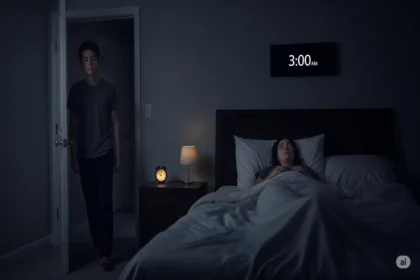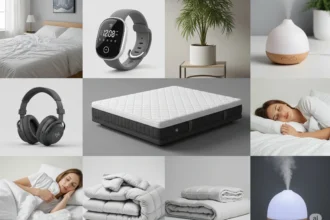The gentle hum of innovation is reverberating through every facet of our lives, and perhaps nowhere is its potential more profound, or indeed more unsettling, than in the realm of sleep. For centuries, our nights have remained a largely unmonitored mystery, a black box of unconscious activity. Now, with the unprecedented rise of AI in sleep, that box is being pried open, offering us a glimpse into a future where our sleep cycles are meticulously tracked, analyzed, and even optimized by algorithms. But as artificial intelligence integrates itself into our bedrooms, a crucial question emerges: Is this powerful technology destined to be our ultimate sleep coach, guiding us to restorative slumber, or could it become a digital Big Brother, silently monitoring our most vulnerable hours?
The promise is alluring: imagine waking up consistently refreshed, without the nagging fatigue that plagues so many. AI, armed with mountains of data and sophisticated algorithms, could potentially analyze every subtle shift in our breathing, heart rate, movement, and even brain waves, offering personalized insights far beyond what any human expert could discern from a few hours in a sleep lab. This isn’t just about smartwatches anymore; we’re talking about smart beds, contact-free sensors, and intelligent apps that learn from your unique physiology. Yet, this incredible capability also ushers in a new era of ethical dilemmas, particularly concerning privacy and autonomy in our most private space.
The AI Sleep Coach: A Promise of Personalized Rest
The current landscape of sleep science often grapples with a fundamental challenge: sleep is incredibly personal. What works for one person might not for another. Traditional sleep advice, while valuable, can feel generic. This is where AI steps in, offering a pathway to hyper-personalization.
- Unprecedented Data Analysis: Wearable devices and in-bed sensors, often equipped with accelerometers, photoplethysmography (PPG) for heart rate, and even radar technology for respiration, generate vast amounts of raw data. AI and machine learning algorithms are designed to sift through this data at speeds and scales impossible for humans. They can identify subtle patterns in sleep stages (light, deep, REM), micro-awakenings, breathing irregularities (like those indicative of sleep apnea), heart rate variability, and even environmental factors like temperature and noise. A recent study developed a transformer-based AI model that analyzes eight hours of sleep signals, including brain, movement, cardiac, and respiratory data, to classify sleep stages with high accuracy, surpassing traditional human scoring in consistency and throughput.
- Personalized Recommendations: Beyond just tracking, AI can learn from your historical data and provide tailored recommendations. If your deep sleep is consistently poor after late-night meals, an AI coach might suggest an earlier dinner. If your REM sleep is disrupted by temperature fluctuations, it could trigger a smart thermostat to adjust accordingly. This dynamic adaptation, constantly learning and refining, moves beyond “one-size-fits-all” advice. For instance, some AI-powered beds now detect snoring and subtly adjust the bed’s position to alleviate it, all without waking the user.
- Accessibility to Sleep Therapy: Cognitive Behavioral Therapy for Insomnia (CBT-I) is considered the gold standard non-pharmacological treatment for chronic insomnia. However, access to trained therapists is limited. AI-driven chatbots and mobile applications are emerging as scalable solutions, delivering personalized CBT-I programs, mindfulness exercises, and relaxation techniques. These AI coaches can adapt interventions based on individual sleep patterns and progress, making evidence-based therapy more widely available.
- Early Disorder Detection: AI’s ability to identify subtle patterns can be a game-changer in detecting underlying sleep disorders like sleep apnea, restless legs syndrome, or chronic insomnia. By analyzing breathing patterns, oxygen saturation, and movement over long periods, AI can flag potential issues that might otherwise go undiagnosed for years, prompting users to seek professional medical advice. This proactive approach can lead to earlier intervention and better health outcomes.
Consider Sarah, a young professional who used to wake up feeling exhausted despite getting 7-8 hours of sleep. Her traditional doctor suggested general sleep hygiene tips, which helped a little. Then, she started using an AI-powered sleep mat. After a few weeks, the app consistently highlighted fragmented deep sleep and occasional breathing irregularities. Prompted by the AI, she consulted a sleep specialist, who diagnosed mild sleep apnea. With treatment, Sarah’s quality of life dramatically improved. “The AI didn’t diagnose me, but it gave me the data I needed to push for a real diagnosis,” she shared. “It was like having a personal sleep detective.”
The Shadow Side: Big Brother in the Bedroom?
While the benefits of AI in sleep are compelling, they are accompanied by a complex web of ethical and privacy concerns that demand our urgent attention. The very intimacy of sleep data makes it particularly sensitive.
- Data Privacy and Security: Sleep trackers collect incredibly personal and granular data: your heart rate, breathing, movements, sleep stages, and even your snoring and coughing patterns. This biometric data, when combined with other personal information (like location, health records if integrated, or even spending habits), creates a highly detailed profile of an individual’s health and lifestyle. Who owns this data? How is it stored? Is it encrypted? Could it be shared with third parties – advertisers, insurance companies, or even employers – without explicit, informed consent? The risk of data breaches, or the potential for this data to be used to discriminate (e.g., higher insurance premiums for “poor sleepers”), is a significant concern. The American Academy of Sleep Medicine (AASM) has emphasized the need for robust security and transparent data practices.
- Algorithmic Bias: AI systems are only as unbiased as the data they are trained on. If training datasets disproportionately represent certain demographics, the AI might perform less accurately for underrepresented groups, potentially leading to misdiagnoses or less effective recommendations. This could exacerbate existing health disparities.
- Over-reliance and “Worried Wells”: Constant monitoring and detailed sleep scores, while informative, can also create anxiety. Individuals might become overly fixated on achieving a “perfect” sleep score, leading to orthosomnia – an unhealthy obsession with sleep quality that paradoxically worsens sleep. Could AI create “worried wells,” making healthy people anxious about minor, non-clinical fluctuations in their sleep patterns?
- The “Black Box” Problem: Many advanced AI algorithms operate as “black boxes,” meaning their decision-making processes are opaque even to their developers. If an AI sleep coach recommends a specific intervention, how can we be sure its reasoning is sound and unbiased? This lack of transparency can erode trust and make it difficult for users or clinicians to understand why certain advice is given.
- The Surveillance Potential: In a broader, more dystopian sense, what are the long-term implications of companies or governments having access to intimate details of our sleep and health? Could this data be used for surveillance, social credit scoring, or other purposes far removed from health optimization? The ethical considerations extend beyond individual privacy to societal implications.
Consider Michael, a meticulous individual who invested heavily in a smart bed system. He quickly became obsessed with his daily “sleep score.” If it dipped, he’d feel anxious all day, replaying his night’s data. This constant self-monitoring, while providing data, began to undermine his natural ability to simply feel rested. He found himself more focused on the numbers than on his actual well-being, trapped in a cycle of data-driven anxiety.
Navigating the Future: A Call for Conscious Integration
The rise of AI in sleep is inevitable. The question isn’t whether it will reshape our relationship with rest, but how we will choose to guide its development and integration. The future of AI in sleep can be incredibly beneficial, acting as a powerful tool for diagnosis, personalization, and education, but only if we proactively address the inherent risks.
The path forward requires:
- Robust Regulation and Standards: Governments and regulatory bodies must establish clear guidelines for data privacy, security, and ethical AI development in health tech. This includes mandating transparency in algorithms and ensuring user consent is truly informed and granular.
- User Empowerment: Individuals must be empowered to understand their data rights, control who accesses their information, and make conscious choices about the level of monitoring they are comfortable with. Education on the limitations and potential biases of AI is crucial.
- Collaboration, Not Replacement: AI should be seen as an assistive tool for sleep specialists, not a replacement. Its strength lies in data analysis and pattern recognition, which can free up human experts to focus on complex diagnoses, nuanced patient care, and personalized therapy delivery.
- Focus on Well-being, Not Just Data: The emphasis should remain on improving actual sleep quality and overall well-being, rather than simply generating impressive “sleep scores.” Tools should be designed to reduce anxiety, not create it.
Ultimately, the power of AI to transform our understanding and management of sleep is immense. It holds the potential to personalize sleep solutions in ways previously unimaginable, democratizing access to expert insights and promoting healthier lives. But like any powerful technology, its deployment demands foresight, ethical consideration, and a steadfast commitment to protecting the individual in their most vulnerable, and vital, state: sleep. The choice between sleep coach and Big Brother will depend entirely on how we choose to build, regulate, and interact with these intelligent systems as they quietly enter our bedrooms.
Disclaimer: The information provided in this article is for general informational purposes only and does not constitute medical advice. It is not a substitute for professional medical advice, diagnosis, or treatment. Always seek the advice of your physician or other qualified health provider with any questions you may have regarding a medical condition. Never disregard professional medical advice or delay in seeking it because of something you have read on this website.














